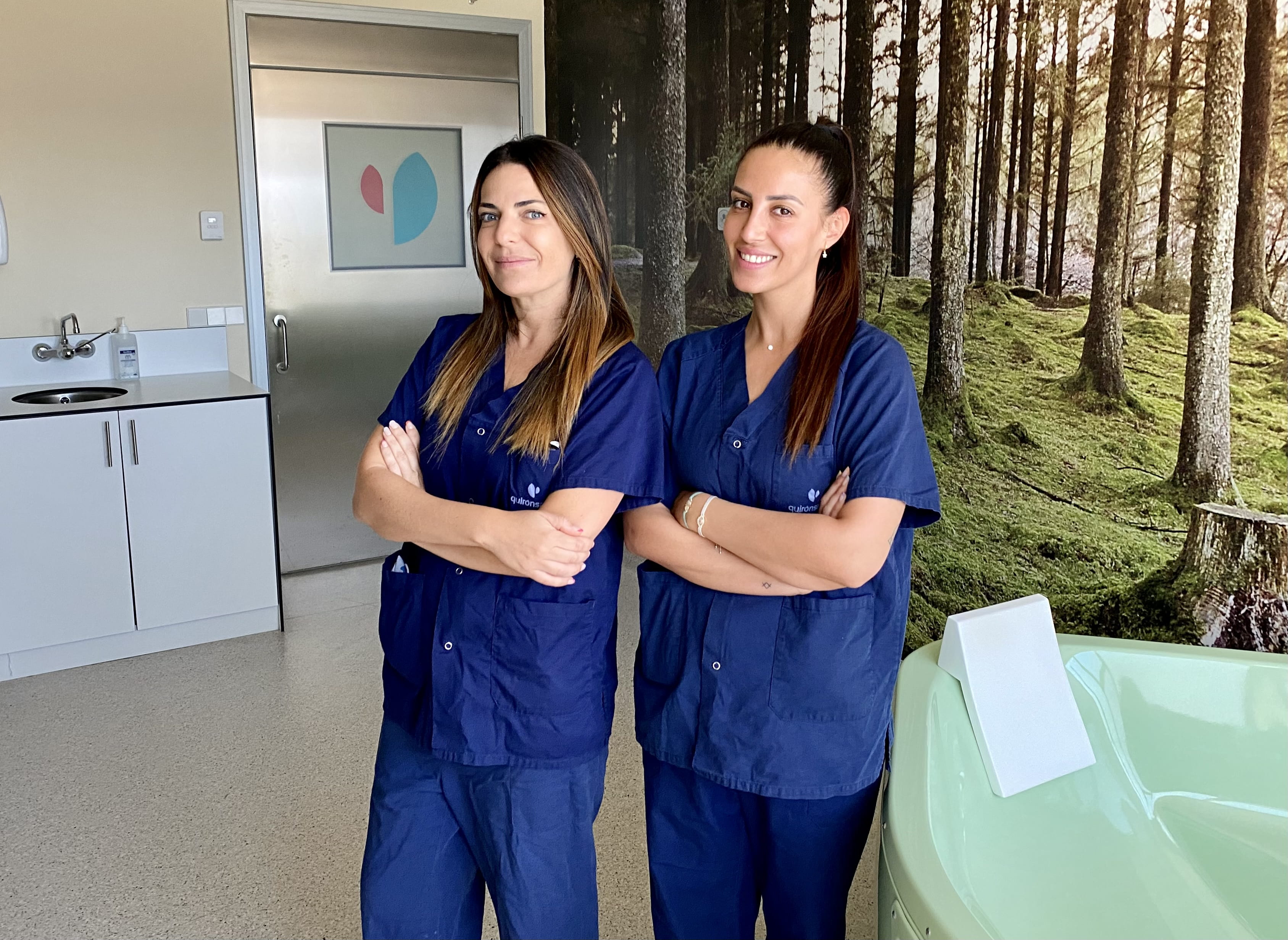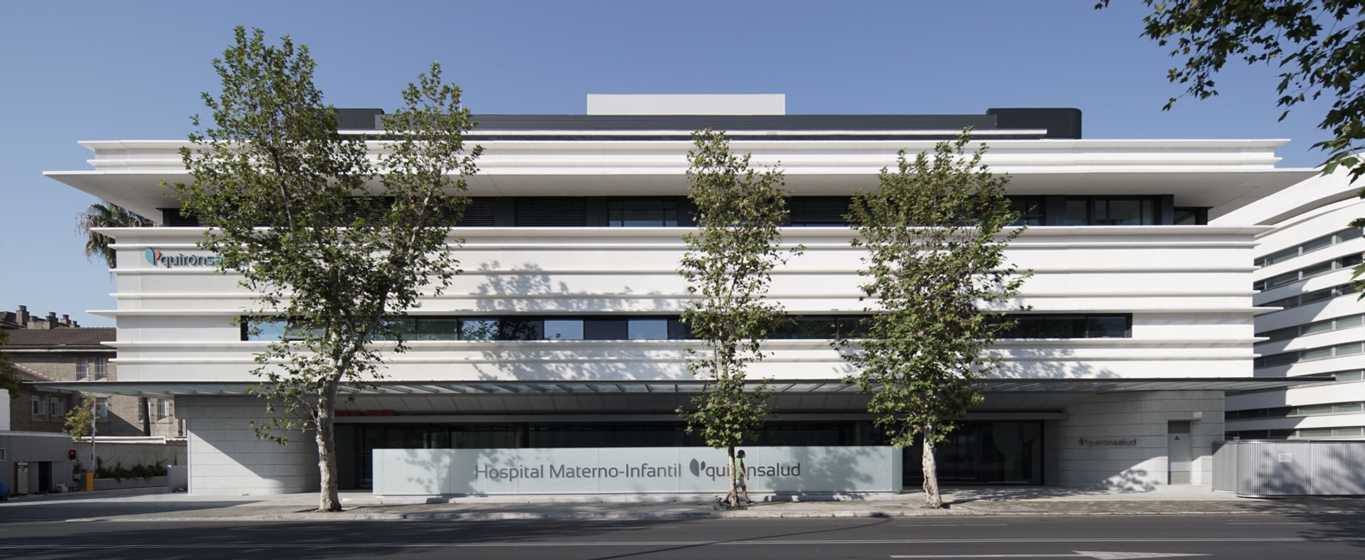Obstetric and gynecology nursing (midwifery)
Solve your doubts about obstetrics-gynaecology nursing and find out about the situations and pathologies it treats. We talk to you about the field of study and the main techniques used by midwives in a woman’s different gynaecological stages. Book your consultation at one of our hospitals.

What is obstetrics-gynaecology nursing?
Our nurses specialising in obstetrics and gynaecology will be in charge of accompanying you during the different stages you go through in life. Midwives provide information on sexual health and family planning. They are also responsible for the prevention of sexually transmitted diseases or the early detection of certain pathologies, such as cervical cancer. They will also look after you during your pregnancy, childbirth and the postpartum period, and will be your main support in establishing breastfeeding.
What does obstetrics-gynaecology nursing study?
Our midwives are responsible for looking after women from the time of their first menstrual period to menopause. This is how we can offer comprehensive care adapted to the needs of each patient. Quirónsalud’s obstetrics and gynaecology specialist nurses are experts in various areas, such as:
- Prevention and sexual health: responsible for advice on contraceptive methods and protection against sexually transmitted diseases, training in breast self-examination, carrying out preventive pap smear tests and activating protocols in cases of suspected gender-based violence.
- Pregnancy: monitors uncomplicated pregnancies, provides guidelines for the upbringing and care of the newborn and offers childbirth preparation classes.
- Childbirth: the midwife accompanies and cares for the mother during the delivery process and assesses foetal wellbeing up to the moment of expulsion.
- Puerperium and lactation: in addition to solving doubts and detecting possible complications, this area focuses on the recovery of the pelvic floor and the establishment of breastfeeding.
- Climacteric: healthcare education in menopause.
Which patients is it for?
As indicated above, the speciality of obstetrics and gynaecology nursing focuses on the care of women throughout their lives and on the detection and treatment of certain reproductive system pathologies.
Techniques, procedures and diagnostic methods
The procedures carried out by midwives vary widely, as they respond to completely different needs. The most prominent include the following:
- Relaxation techniques: teaching women breathing exercises that promote relaxation during labour. Sometimes involves massaging or applying pressure to painful areas to relieve pain.
- Foetal monitoring: diagnostic method that studies the baby’s heart rate to assess its state of health.
- Pap smear: your gynaecologist or obstetrician may perform a diagnostic test in which a sample of tissue is taken and analysed to detect possible cancerous cells in the cervix and certain infections, such as human papillomavirus (HPV)
- Cutting the umbilical cord: once the umbilical cord has stopped beating, two clamps are placed on the cord and a cut is made between the two clamps. The clamp is kept closer to the navel during the first 24 hours to avoid blood loss. This test may be performed by your gynaecologist or obstetrician
- Sutures: after delivery, if an episiotomy has been performed or if there has been any tearing, the incision is stitched to facilitate healing.
Diseases and symptoms
Main pathologies and diseases
Obstetrics and gynaecology nurses diagnose certain diseases and manage common situations, such as:
- First menstrual period
- Implantation bleeding
- Family planning
- Sexually Transmitted Diseases
- Pregnancy
- Breastfeeding
- Postpartum depression
- Cervical cancer
- Menopause
Related symptoms
The symptoms most commonly shared with the midwife in a consultation include:
- Tiredness and fatigue
- Constipation
- Nausea and vomiting
- Dysuria or Pain during urination
- Loss of sexual appetite
- Swelling
- Vaginal pain
- Urine leaks
- Contractions during pregnancy
About the obstetrics-gynaecology consultation
We solve any doubts you may have before you see the specialist
There are many more reasons to visit your midwife, beyond pregnancy. For example, to receive pre-conception counselling, to find the most suitable contraceptive method for each person, to ask any questions about sexual and reproductive health, to have routine pap smears after the age of 21 or to alleviate the side effects of menopause.
What should you keep in mind?
If the first visit to the midwife takes place at the onset of menstruation, the nurse will take the patient’s medical history and offer counselling on this new stage and on sexual and reproductive health issues.
If the first visit is during pregnancy, the midwife will calculate the weeks of gestation, establish the estimated delivery date, prescribe the necessary vitamins and answer any questions you may have.
What should I take to the appointment?
We recommend that you bring comfortable clothes to the consultation to facilitate the examination and a list of all your doubts, whether or not it is your first visit. In case of pregnancy, you should provide the date of your last menstrual period and any symptoms noted.
You may receive a questionnaire a few days before your appointment asking about your medical history, usual medication and other specific questions that will allow us to anticipate certain aspects of your consultation, helping us expedite your treatment and offer you a more personalised care. To do this, we recommend that you download the free Quirónsalud Patient Portal application, which will facilitate communication with your healthcare team.

If you have any further questions, please contact us through the Patient Services telephone number: 900 301 013





















